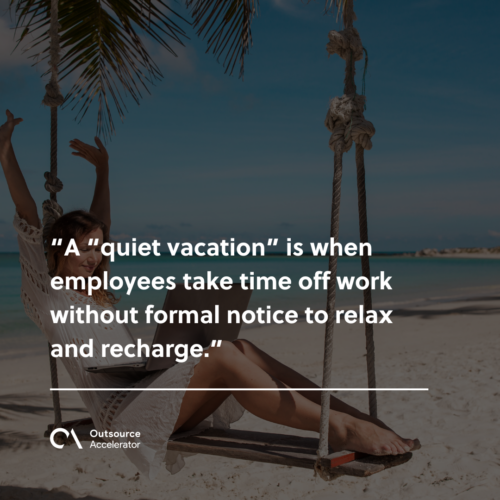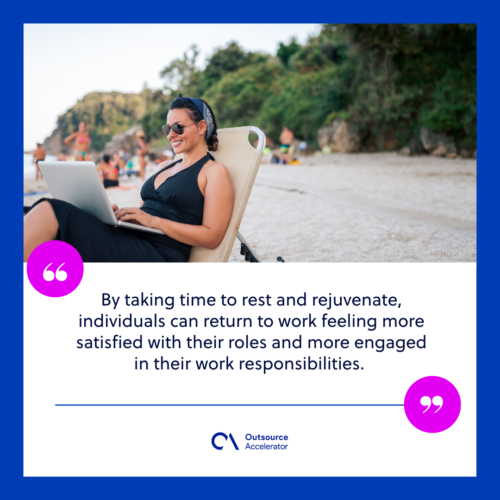The rise of the quiet vacation in the workplace

Are you feeling drained from endless meetings and 24/7 emails? The daily grind can weather even the most resilient workers, and everyone could use a break to recharge and disconnect from their jobs.
To solve this, one would usually pause their work, file a vacation leave, and then take time off to travel or rest.
However, there’s an ongoing millennial trend that skips that second step.
Taking this kind of “quiet vacation” allows employees to step away from work without the usual fanfare or social media posts announcing their break. For many, this also includes not telling their superiors.
In this article, we’ll explore the concept of quiet vacationing and why many younger employees are taking part.
What is a quiet vacation?
A “quiet vacation” is when employees take time off work without formal notice to relax and recharge. It involves individuals engaging in activities such as travel or focusing on personal activities at home while pretending to be working.
The practice is also known as “quiet vacationing,” “hush vacation,” “hush trip,” or “workcation.” It’s a growing trend among millennial workers especially, with 37% taking time off without communication, according to a recent Harris Poll study.
Despite its appeal to help professionals recharge and return with more focus, there have been discussions about the ethical implications of quiet vacation in the workforce.

The appeal of the quiet vacation
There is a definite appeal to the quiet vacation. Like any regular vacation, it offers a chance for people to refresh themselves all in the pursuit of a healthy work-life balance.
Many would point to these key advantages as their reason for taking quiet vacations:
Flexibility and time management
For those who can manage it, quiet vacationing allows employees to take time off without falling behind on work. It offers flexibility in scheduling vacations when needed, enabling people to manage their time more effectively while maintaining productivity.
Reduced stress and improved well-being
Taking a quiet vacation can help reduce stress levels and improve overall well-being. By temporarily disconnecting from work, employees can relax, unwind, and focus on self-care.
A short break can have positive effects on their mental health.
Enhanced focus and productivity
Engaging in quiet vacation activities can enhance a person’s focus and productivity when they return to work.
Taking a break from the routine can help employees reset, clear their minds, and come back with renewed energy and motivation.
Work-life balance
A quiet vacation contributes to a better work-life balance. It allows employees to prioritize their personal time and relaxation.
A study by isolved revealed that 65% of their surveyed full-time employees experienced burnout in their roles.
Through a quiet vacation, they can temporarily step away from work responsibilities, creating boundaries that support a healthier balance between work and personal life.
Increased job satisfaction
Employees who take a quiet vacation may experience increased job satisfaction. By taking time to rest and rejuvenate, individuals can return to work feeling more satisfied with their roles and more engaged in their work responsibilities.
That’s all well and good, of course. But technically, these benefits could also be achieved by simply filing for a regular vacation.
The caveat of a quiet vacation is that it necessitates not informing managers. Naturally, this hasn’t sat well with employers.

Ethical considerations of quiet vacations
The practice of quiet vacationing raises ethical considerations that employers, employees, and industry experts have begun to examine and discuss.
Some of these include:
Transparency and honesty
One of the primary ethical concerns regarding the quiet vacation is the issue of transparency and honesty.
When employees engage in quiet vacationing, they may be perceived as deceptive or untruthful because they are not honest about their time off.
Employers expect honesty and transparency in managing work schedules and time off. It’s important for employees to communicate openly about their need for a break, especially in the age of remote work.
Equity and fairness
Colleagues who adhere to the traditional vacation request process may view quiet vacationing as unfair. They may see it as providing an advantage to those who engage in it.
These employees may hold resentment, which may affect productivity and the team culture.
Impact on work quality and team collaboration
From an ethical perspective, there are concerns about the impact of the quiet vacation on work quality and team collaboration.
Without clear communication regarding time off, things like work processes, deadlines, and team coordination can suffer. This can potentially compromise work quality and efficiency, impacting the organization as a whole.
Admittedly, there are factors that are beyond employers’ control that affect people’s decision to engage in a quiet vacation. For example, language-learning app Babbel points to travel anxiety as a culprit.
Still, there are actions that can be taken to reduce this.
What should be done about quiet vacations?
While this isn’t a practice that aims to burn corporations to the ground, something must still be done about quiet vacations.
However, the best methods aren’t to crack down on these “rebellious” employees but rather to understand where they’re coming from and ensure they are helped.
Here are some actions that both ends can take to manage quiet vacations:
What employers can do about quiet vacations
1. Develop transparent policies and guidelines related to time off. Clearly communicate expectations regarding requesting time off and notifying colleagues.
2. Foster a culture of trust and open dialogue where employees feel comfortable discussing their need for time off.

3. Offer flexible work arrangements that accommodate different preferences for time off.
What employees can do about quiet vacations:
1. Be open and honest about your need for time off. Communicate your availability to colleagues and supervisors in advance to minimize disruptions and ensure workflow continuity.
2. Plan your breaks responsibly, taking into consideration project deadlines, team responsibilities, and the impact of your absence on your co-workers.
3. Maintain professionalism and offer support or assistance before and after your time off to maintain a collaborative environment.







 Independent
Independent




